Daily Vocabulary Words: List of Daily Used Words
Hi there. Welcome to this special section @ Wordpandit.
Our endeavour here is straightforward: highlighting important daily vocabulary words, you would encounter in The Hindu. This is your repository of commonly used words; essentially, we are posting a list of daily used words. Hence, this has significant practical application as it teaches you words that are commonly used in a leading publication such as The Hindu.
Visit the website daily to learn words from The Hindu.
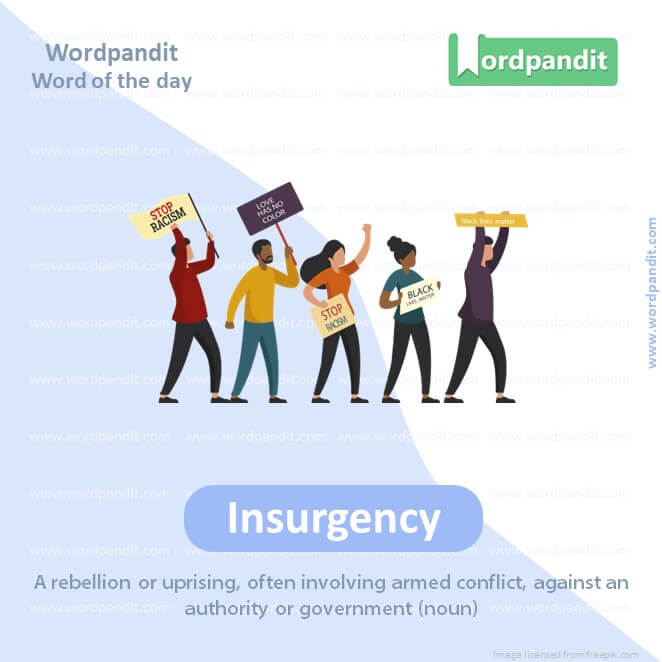
WORD-1: Insurgency
CONTEXT: In a conflict-prone border province such as Jammu and Kashmir (J&K), security forces have to tackle not only terrorism but also engage in counter-insurgency operations in a precise and just manner.
SOURCE: The Hindu
EXPLANATORY PARAGRAPH: Insurgency is like when a group of people decide they don’t agree with the rules or the people in charge, and they try to change it, sometimes by fighting.
MEANING: A rebellion or uprising, often involving armed conflict, against an authority or government (noun).
PRONUNCIATION: in-SUR-jen-see
SYNONYMS: Rebellion, Revolt, Uprising, Mutiny, Revolt.
USAGE EXAMPLES:
1. The government struggled to control the insurgency in the northern regions.
2. News reported an increase in insurgency activities.
3. The military was deployed to quell the insurgency.
4. The insurgency has been ongoing for several years.
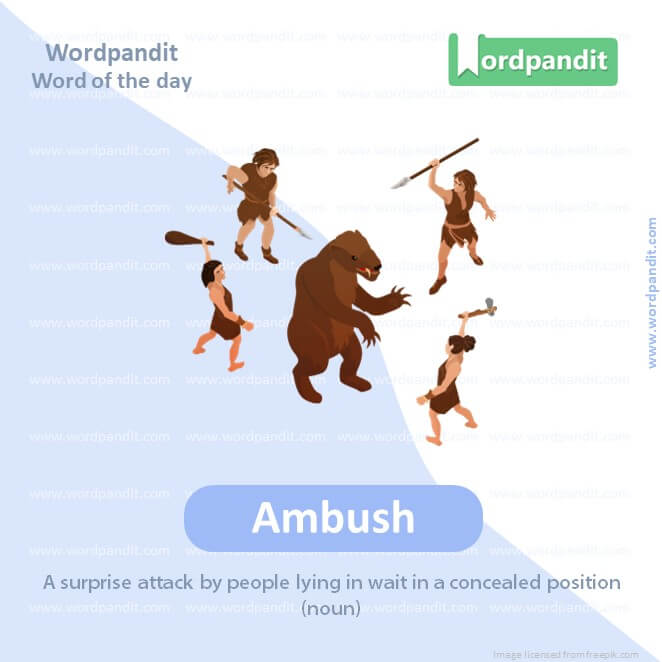
WORD-2: Ambush
CONTEXT: Counter-insurgency operations of the kind that followed the ambush last week breed discontent among residents in a region which has not been supportive of militancy in the near past.
SOURCE: The Hindu
EXPLANATORY PARAGRAPH: Ambush is like hiding and then suddenly jumping out to surprise someone, often to catch them when they’re not ready.
MEANING: A surprise attack by people lying in wait in a concealed position (noun).
PRONUNCIATION: AM-bush
SYNONYMS: Trap, Surprise attack, Snare, Waylay, Stealth attack.
USAGE EXAMPLES:
1. The soldiers were caught in an ambush.
2. They planned an ambush at dawn.
3. The tiger lay in ambush, waiting for its prey.
4. The ambush was successful in capturing the enemy.
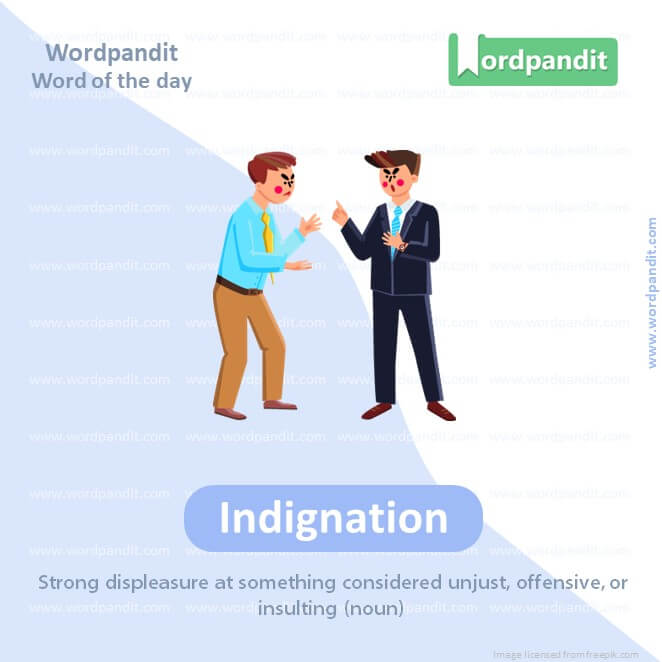
WORD-3: Indignation
CONTEXT: the forces into committing rights violations against civilians and to use grievances and indignation among them to increase their own support base.
SOURCE: The Hindu
EXPLANATORY PARAGRAPH: Indignation is feeling very upset and angry because something is not fair or right.
MEANING: Strong displeasure at something considered unjust, offensive, or insulting (noun).
PRONUNCIATION: in-dig-NAY-shun
SYNONYMS: Anger, Outrage, Resentment, Fury, Annoyance.
USAGE EXAMPLES:
1. She expressed her indignation over the unfair treatment.
2. There was a sense of indignation among the workers.
3. His comments caused widespread indignation.
4. She couldn’t hide her indignation at the decision.
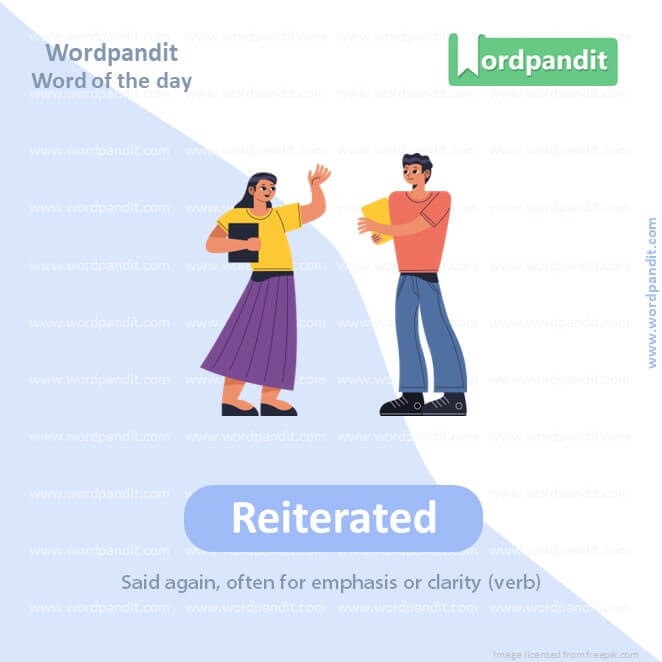
WORD-4: Reiterated
CONTEXT: Last week’s Indian Premier League’s (IPL) auction in Dubai reiterated the sporting brand’s enduring value and financial muscle.
SOURCE: The Hindu
EXPLANATORY PARAGRAPH: Reiterated means saying something again, maybe in a slightly different way, to make sure people understand it.
MEANING: Said again, often for emphasis or clarity (verb).
PRONUNCIATION: ree-IT-er-ay-ted
SYNONYMS: Repeat, Restate, Recapitulate, Echo, Reaffirm.
USAGE EXAMPLES:
1. The teacher reiterated the instructions.
2. He reiterated his commitment to the project.
3. The point was reiterated during the meeting.
4. She reiterated her request for more information.
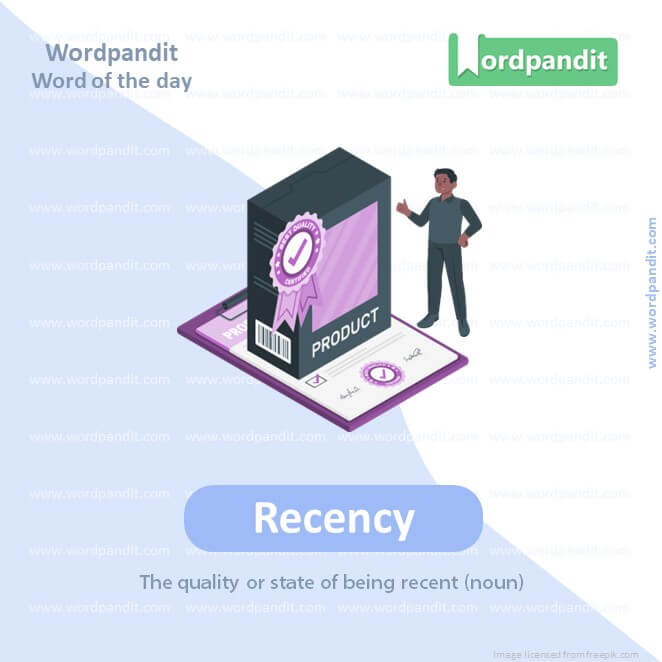
WORD-5: Recency
CONTEXT: The latest auction with its overseas tryst had an obvious recency bias as evident in the World Cup winning Australian squad’s trio of skipper Pat Cummins, Mitchell Starc and Travis Head eliciting competitive bids.
SOURCE: The Hindu
EXPLANATORY PARAGRAPH: Recency is about something happening not long ago, like if you just had a snack or just played outside.
MEANING: The quality or state of being recent (noun).
PRONUNCIATION: REE-sen-see
SYNONYMS: Newness, Freshness, Lately, Modernity, Currentness.
USAGE EXAMPLES:
1. The recency of the event made it more shocking.
2. Due to its recency, few people knew about the new policy.
3. The recency of the information was critical.
4. His memories were clouded by the recency of the trauma.
WORD-6: Chequered
CONTEXT: He was subsequently appointed as the Mumbai Indians’ captain and that meant Rohit Sharma’s chequered history as an IPL captain had perhaps drawn to a close.
SOURCE: The Hindu
EXPLANATORY PARAGRAPH: Chequered is like a pattern of squares with different colors, or when things keep changing, sometimes good and sometimes not so good.
MEANING: Marked by varied fortunes or changes, like a pattern of squares (adjective).
PRONUNCIATION: CHEK-erd
SYNONYMS: Varied, Patchy, Diverse, Inconsistent, Spotted.
USAGE EXAMPLES:
1. He had a chequered career in politics.
2. The company’s history is chequered.
3. A chequered tablecloth covered the table.
4. Her chequered past made her an interesting character.
WORD-7: Presumption
CONTEXT: the presumption is that Pandya will continue to lead India in the shortest format.
SOURCE: The Hindu
EXPLANATORY PARAGRAPH: Presumption is like thinking something is true without having all the facts, kind of like guessing.
MEANING: An assumption or belief without proof, or acting in a way that’s too confident (noun).
PRONUNCIATION: pre-ZUMP-shun
SYNONYMS: Assumption, Supposition, Belief, Conjecture, Speculation.
USAGE EXAMPLES:
1. It’s a presumption to think he’ll agree.
2. The presumption of innocence is important in law.
3. His presumption annoyed his colleagues.
4. There’s a presumption that the missing items were stolen.
WORD-8: Pertinent
CONTEXT: A happiness-induced development model for India is more pertinent than the current model of mere economic development.
SOURCE: The Hindu
EXPLANATORY PARAGRAPH: Pertinent is like when something is really important or related to what you’re talking about or doing.
MEANING: Relevant or applicable to a particular matter; fitting (adjective).
PRONUNCIATION: PUR-ti-nent
SYNONYMS: Relevant, Applicable, Suitable, Appropriate, Germane.
USAGE EXAMPLES:
1. She asked a question that was pertinent to the subject.
2. The article was pertinent to our discussion.
3. He gave some pertinent advice.
4. Only pertinent information was included in the report.
WORD-9: Intended
CONTEXT: This moment also gives us an opportunity to assess the idea of development intended.
SOURCE: The Hindu
EXPLANATORY PARAGRAPH: Intended is like planning or wanting something to happen in a certain way.
MEANING: Planned or meant to happen; designed (verb or adjective).
PRONUNCIATION: in-TEN-ded
SYNONYMS: Planned, Meant, Aimed, Purposed, Designated.
USAGE EXAMPLES:
1. The message was intended for you.
2. The park was intended as a community space.
3. The comment was not intended to offend.
4. They intended to arrive early.
WORD-10: Modernity
CONTEXT: Critics of development have consistently raised concerns about the conventional models of economic growth, challenging the contentious notions surrounding modernity and progress.
SOURCE: The Hindu
EXPLANATORY PARAGRAPH: Modernity is about being new, like the latest toys or gadgets, or the way people live now compared to a long time ago.
MEANING: The quality or condition of being modern; contemporary times or characteristics (noun).
PRONUNCIATION: moh-DER-ni-tee
SYNONYMS: Contemporary, Newness, Currentness, Novelty, Present-day.
USAGE EXAMPLES:
1. The city is known for its modernity.
2. Modernity has brought many changes.
3. He struggled to keep up with the pace of modernity.
4. The building’s design reflected modernity.
Vocabulary
Language is a confluence of thoughts, emotions, and experiences that find vibrant expression through words. In this spectrum, ‘vocabulary’ shines as a critical aspect that shapes and directs our language proficiency. It offers depth, nuance, and clarity to our expressions. However, mastering ‘vocabulary’ is an art that requires a strategized approach.
An intensive strategy for learning ‘vocabulary’ goes beyond the limiting precincts of memorization. Instead, it nudges learners towards comprehension and application. To understand ‘vocabulary’, take a step forward from traditional textbooks and classroom sessions, and embrace the vast world of books, articles, podcasts or digital content in the language you are learning. This step allows you to understand words in context, see how they are used in different situations, and absorb words as part of the natural flow of language.
As you journey through ‘vocabulary’, remember that this expedition should not be a race. Rather, it’s a marathon where pacing yourself is pivotal to long-term success. Learning a few words each day and consolidating your knowledge through regular revision tends to be more effective, as it prevents cognitive overload and promotes solid retention.
Interactive learning tools can provide valuable support in assimilating ‘vocabulary’. Use of flashcards, language-learning apps, or memory-enhancing software can make this process more engaging and effective, reinforcing the ‘vocabulary’ in your memory.
Lastly, practice is an incontrovertible part of mastering ‘vocabulary’. Utilize the learnt vocabulary in your daily conversations, write-ups, or presentations to ensure an active application. Doing this fosters recall and cements understanding.
In summation, learning ‘vocabulary’ is a journey that should be embraced with an integrated approach, where understanding and application are the key elements. By engaging with diverse learning resources, pacing the learning process, employing interactive learning tools, and practicing regularly, the journey of mastering ‘vocabulary’ becomes a fulfilling and enriching experience.













